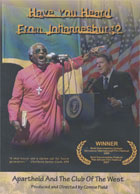
Have You Heard from Johannesburg? Apartheid and the Club of the West 2007
Distributed by California Newsreel, Order Dept., PO Box 2284, South Burlington, VT 05407; 877-811-7495 (toll free)
Produced by Connie Field
Directed by Connie Field
DVD , color and b&, 89 min.
Jr. High - Adult
African American Studies, African Studies, Human Rights
Date Entered: 05/19/2008
Reviewed by Patricia B. McGee, Coordinator of Media Services, Volpe Library & Media Center, Tennessee Technological UniversityApartheid and the Club of the West, Connie Field’s fourth installment in her six part examination of the fall of apartheid, Have You Heard from Johannesburg? chronicles the struggle against South African racial separation as it played out in the United States. Set against the backdrop of the administration of Ronald Reagan, a coalition of civic groups, political organizations, unions, religious institutions, university students, and ordinary citizens engaged in a variety of classic protest tactics that ultimately forced a change in U.S. government policy. The Reagan position, along with its European allies, was one of “constructive engagement,” positive support for the government of South Africa rather than negative sanctions. Official American policy insisted that economic sanctions would hurt the very people they were intended to help—poor black South Africans.
In Washington DC, in what has been described as the “longest running act of civil disobedience in U.S. history,” marchers picketed the South African Embassy; luminaries such as D.C. Congressman Walter Fauntroy, Rosa Parks and Stevie Wonder were jailed by DC police in what came to be referred to as “designer arrests.” On university campuses students campaigned to persuade administration policy to shift endowment funds to one of divestment, selling all shares in companies that refused to stop doing business in South Africa. On the state and local levels coalitions of activists promoted divestment policies; in Massachusetts even going so far as to pass a bill over the governor’s veto.
By interspersing footage of events in the United States with scenes of rioting, brutal police actions, arrests and attempts to censor the press, it is clear that the small steps taken by South Africa in the wake of divestment were indeed only window dressing, token changes. As Bishop Desmond Tutu so eloquently asserted, “we don’t want reform… Apartheid does not deserve to be reformed.” The climax came in the fall of 1986; after President Reagan vetoed a moderate congressional measure that provided for sanctions against South Africa, Congress overrode his veto. The leadership of the Black Congressional Caucus and overwhelming grass roots pressure lead to a milestone for the African American community. This was the first time African Americans had been able to have a significant effect on American foreign policy.
This finely crafted documentary includes interviews with the participants in the apartheid struggle, still shots, newsreel and archival footage. Apartheid and the Club of the West presents a thoughtful and perceptive analysis of a complex legal, political and moral issue and is highly recommended for all viewers.
Awards
- National Film Board of Canada Award for Best Documentary Feature, Vancouver International Film Festival 2006
- Jury Award for Best Documentary Feature, Pan African Film Festival 2007